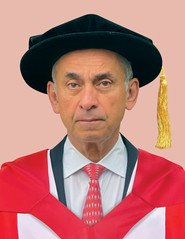
Pro-Chancellor Sir David Li, President Zhang, Members of the academic procession, Fellow Honorary Graduates, distinguished guests, Ladies and Gentlemen.
Let me start by expressing my thanks to the University of Hong Kong for awarding me this Honorary Degree, and for the most generous citation.
It is an honour and a pleasure to be here with you to celebrate the fantastic achievements of this year’s graduates and to be in the company of such esteemed fellow honorary graduands.
It is especially so in this COVID-19 pandemic year which has brought so much death and suffering and been so challenging for families - and economies - across the globe.
Yet at the same time the pandemic has revealed something else: the extraordinary contribution played by scientists and physicians in developing treatments and vaccines effective against this deadly disease. Together their efforts have saved countless lives and I am proud to number myself among them.
Academic institutions have faced particular challenges and Hong Kong has its own difficulties. So the opportunity to celebrate this moment with you today is especially poignant and I am grateful for it.
As you heard earlier, I was born in Baghdad to Armenian parents displaced by the 1915 genocide. We were refugees and while we thrived in Iraq, by the late 1970s my father was clear we had to move on. After studying medicine in Ireland I moved to the UK.
Three principles have governed my career since. The first is that decisions, whether clinical or political, must be evidence-based. This has lately been demonstrated in the UK with politicians wedded to a new political mantra as we emerge by stages from the lockdown. And the mantra is : “Data, not dates.”
The second principle is quality. It must be the organising principle of all we do. Involving professionals in decisions and holding them responsible for outcomes is far more effective than command and control. It was the central recommendation in my 2008 report as the UK Minister of Health, High Quality Care for All, and I believe it still remains as true today.
The third principle is innovation and the key importance of finding ways to foster it. Without innovation, institutions wither. Investment is essential to promote innovation. A good example is the huge sums invested in vaccine development against COVID-19. We must take risks or we are lost.
As I have learnt, if you take risks, people will take a risk on you. That is how I have gained many of the opportunities I have had. Passion, excitement and self-belief will carry you a long way.
At Imperial College London, I have been able to combine my roles as a surgeon looking after patients, and as a clinical academic bringing evidence-based advances from the bench to bedside. Looking after patients has helped me hold my focus on the prime objective of everything we do – their welfare.
None of this would have been possible without my highly skilled, enthusiastic and dedicated team. I have benefited from the support of so many throughout my career – my family, my friends, colleagues, students – to whom I will always be grateful.
Life surprises you at every turn. I could never have predicted that this time last year I would be volunteering in intensive care, learning how to roll patients on ventilators and taking instructions from senior intensive care nurses who were significantly more experienced than I was.
My message to today’s graduands is: seize opportunities when they are presented to you, learn new skills and never pass up a challenge. To maximise your potential, surround yourself with smart people. The team you work with is absolutely critical in achieving your goals, and this extends to all walks of life. I congratulate you on your achievements and I wish you every success in your careers in the future.
And to the University of Hong Kong, I say again thank you for this honorary degree, which I am privileged to receive. Thank you.




